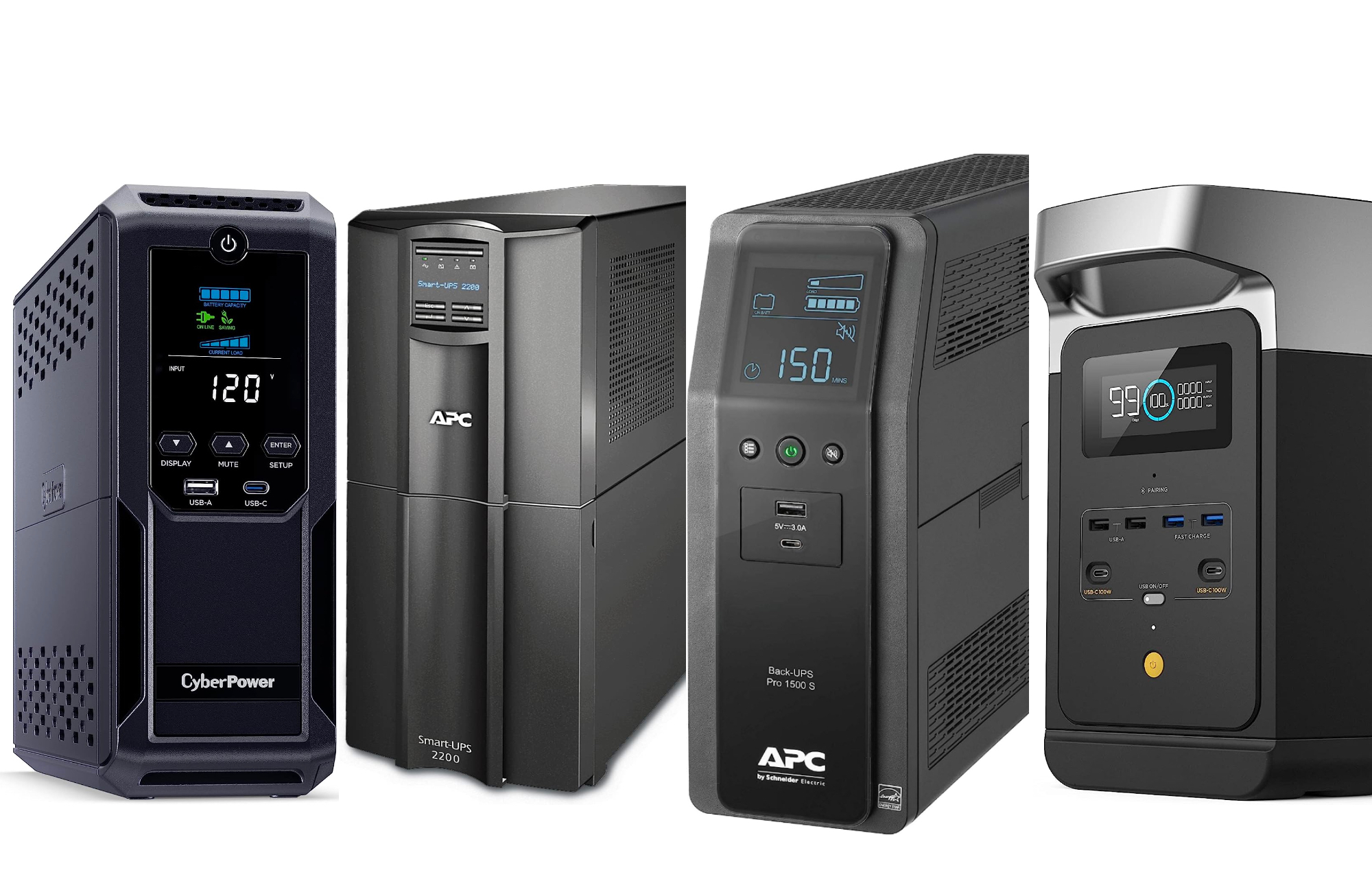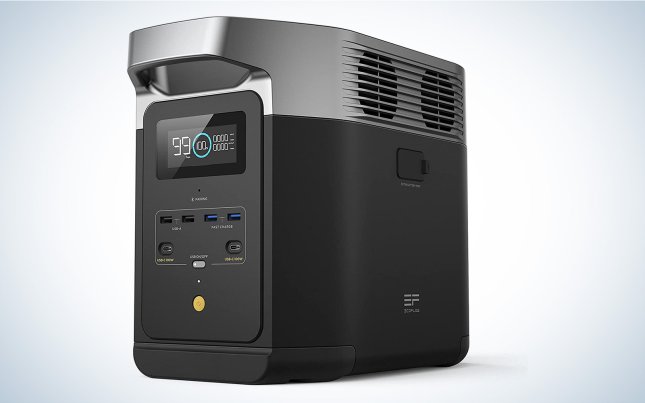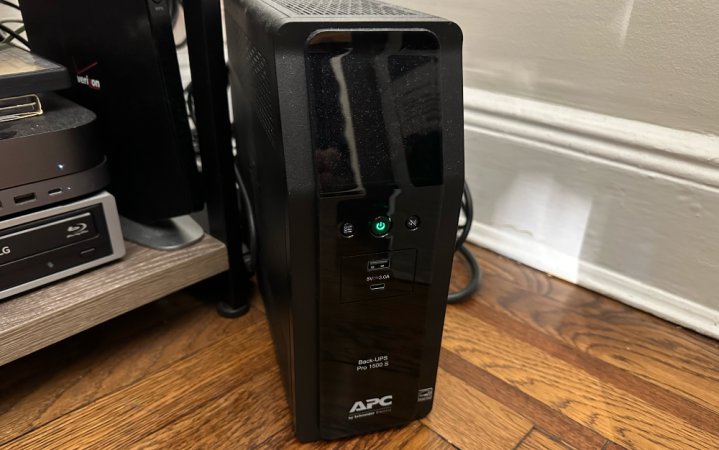We may earn revenue from the products available on this page and participate in affiliate programs. Learn more ›

Losing power is never fun, but it can also seriously mess with your electronics, especially if you don’t have a battery backup. Computers, external hard drives, home WiFi networks, and more all feel the negative effects of an outage. So, it’s important to create an action plan to keep your home or your business—or both—running during these possible future blackouts. One important part of your plan should be considering battery backups—also known as an uninterruptible power supply, or UPS—which will automatically take over when the power drops or goes out entirely. But no one solution’s perfect for everyone. To help you narrow those choices, we’ve compiled a list of the five best battery backups currently available.
- Best overall: CyberPower CP1500AVRLCD3 Intelligent LCD UPS System
- Best portable: EF ECOFLOW DELTA 2
- Best for a network: APC UPS, 1500VA Sine Wave UPS
- Best for businesses: APC 2200VA Smart UPS with SmartConnect
- Best budget: Tripp Lite AVR750U 750VA UPS
How we chose the best battery backups
For most of the UPS models in this guide, we focused on the home user, so we selected units that were less than $300. However, for one, “Best for businesses,” we selected a more expensive model since most small business owners are likely to pay more for a more robust UPS that can handle more machines.
Next, we prioritized UPS options that output as a clean sine waveform instead of a simulated sine waveform. This feature is important for more sensitive components, like gaming systems and audio equipment.
We also considered many other features that we considered important; for instance, we looked for UPS models that included surge protection features, like line interactive topology, which uses an automatic voltage regulator to normalize any dips or spikes in power in active (or non-battery backup) mode. We also considered other features: How many outputs did the UPS have? How many outlets were both battery-and-surge-protected outlets? How many outlets had only surge protection? Plus, we considered USB ports and the length of the power cord. These details can sound pedantic, but they can make a huge difference in day-to-day use.
Even if you’re not prone to power outages, many UPS models also include surge protection features. An automatic voltage regulator smoothes over brownouts and spikes without needing to change your battery. It’s one of several capabilities you’ll want to look for in the best battery backups.
The best battery backups: Reviews & Recommendations
Losing power is stressful, so don’t let your offline router and computer add to it. The best battery backups can give you peace of mind that your electronics aren’t in the dark while you call the electric company. Some might need a more powerful and versatile solution—particularly if you’re looking to back up the equipment in your business. Or maybe you have computers and laptops that are particularly sensitive. And you’ll find that UPS models have a broad price range—you can buy one for under $100 or spend thousands of dollars. Here are our choices for users of all types.
Best overall: CyberPower CP1500AVRLCD3 Intelligent LCD UPS System
Best Overall UPS
A Better Backup
Pros
- 12 outlets (6 with both battery backup and surge protection)
- Includes line interactive topology, with automatic voltage regulator
- LCD screen
Cons
- Simulated sine wave power
Why it made the cut: This strikes the best balance of features, power, outlets, and price for most people.
Specs
- Power/Watts: 1500AV/900W
- Battery & Surge Protected: 6 outlets
- Surge Protected Only: 6 outlets
This mini-tower UPS from CyberPower provides quite a bit of power (900 Watts), which can power various devices—such as desktop computers, workstations, networking devices, and home entertainment equipment. It has a multifunction LCD and includes line interactive technology, which uses an automatic voltage regulator to monitor and adjust for dips and spikes in power. Despite all of its muscle, it still runs quietly.
The UPS comes with 12 outlets—six that have booth battery backup and surge protection and six outlets that only have surge protection. It has an 8-hour recharge time and includes ports for your phones and network. But its output has a simulated sinewave waveform, which may be a problem with more sensitive computers and tech gear. Be sure to check the specs on your devices to make sure they’re combative with this UPS.
The CyberPower CP1500AVRLCD3 Intelligent LCD UPS also comes with the company’s Powerpanel personal-editing software, which allows you to monitor the UPS unit remotely.
Best portable: EF ECOFLOW DELTA 2
On-The-Go Backup
Pros
- Powerful
- Portable
- Lots of sockets
- Capable of charging and discharging more times than other backups
- Slick design
Cons
- Pricey
Why it made the cut: It’s one of the most portable UPS, which also comes with a pure sine wave form.
Specs
- Watts: 1,024 watts
- Power Outlets: 6 AC outlets, 4 USB-A, 2 USB-C, Car socket
- USB Ports: 4 USB ports
EF ECOFLOW’s 1,024-watt DELTA 2 portable power station doesn’t rely on lithium-ion batteries. Instead, it comes equipped with LiFePO4 batteries that won’t degrade as quickly with everyday use. It’s powerful enough to run appliances, so it can really come in handy on an RV or as an emergency backup during storms or other power outages. We went hands-on with the DELTA 2 and found it easy to set up and use. The unit charged up in about 80 minutes through an AC outlet but could be topped up with solar panels for a truly off-the-grid experience. We were especially impressed with the level of performance we got from the DELTA 2, given its small size and lightweight. The battery backup was easy to move around, thanks to built-in handles.
The DELTA 2 has plenty of connectivity to go with that power. You’ll find three AC outlets with grounds and three without. It offers four USB-A ports and two fast-charging USB-C ports for slinging juice into your mobile devices or tablets. The results of our testing found that the DELTA 2 wasn’t designed for any particular purpose (camping, emergency preparedness, etc.) but would work well in all of those scenarios. As such, we have no problem recommending it to anyone who wants a battery backup they can rely on to provide hours of juice for portable gadgets and appliances alike.
Best for a network: APC UPS, 1500VA Sine Wave UPS
Best UPS for a network
Safeguarding Your Network
Pros
- Includes line interactive topolgy, with automatic voltage regulator
- Angled LCD to view UPS status
- Uses a pure sine wave form
- Includes a six-foot power cord
Cons
- Fewer surge-protected only outlets than other models
- Larger than others in its class
Why it made the cut: Although it’s a bit pricey, this APC UPS offers a lot of power and clean sine wave output for even sensitive computers and devices.
Specs
- Power/Watts: 1500AV/900W
- Battery & Surge Protected: 5 outlets
- Surge Protected Only: 5 outlets
This model makes for an excellent UPS for your home network because it gives output power in a pure sine wave form. That means sensitive equipment, like networking or high-end audio gear, will work fine since output power is clean. It also offers additional connections and ports: 1Gb and coax protection and includes two USB ports—one type A and one type C. So, it’s easy to have a battery backup for the most important components in your network.
It also will regulate your system when it’s not functioning in battery backup since it has line interactive topology, with automatic voltage regulator. Another nice touch is that they’ve angled the LCD, so viewing the UPS status is easier. And it comes with a 6-foot power cord and power-management software for Windows PC (macOS uses native ‘Energy Saver’ in settings).
Best for businesses: APC 2200VA Smart UPS with SmartConnect
Best UPS for business
Big business backup

Pros
- Cloud-enabled UPS
- Includes line interactive topology, with automatic voltage regulator
- Uses a pure sine wave form
Cons
- Expensive
- Heavy
Why it made the cut: This APC UPS is expensive, but ample power and advanced features make it attractive for business users.
Specs
- Power/Watts: 2200VA / 1980W
- Battery & Surge Protected: 8 outlets
- Surge Protected Only: 2 outlets
One feature that stands out on the APC 2200VA is that it has APC’s SmartConnect technology, which allows your UPS to be cloud-enabled. According to the company, you can log in via a “secure portal (via any internet-connected device).” Then “you can view the status of your UPS, receive notifications, get firmware updates, and more.” So for those who might not have time to monitor or the money to have any IT department monitor the UPS, this can be quite valuable.
It also has a lot of power for hooking up many devices, including your network, into the system. You get 10 outlets, eight of which are both power-backed and surge-protected. The UPS also has both line interactive topology (via an automatic voltage regulator). It uses a clean pure sine wave form for output, which makes it compatible with most any computer or audio gear.
Best budget: Tripp Lite AVR750U 750VA UPS
Best budget UPS
Barebones Budget Backup
Pros
- Inexpensive
- 12 outlets (6 with both battery backup and surge protection
- Includes line interactive topology, with automatic voltage regulator
Cons
- Simulated sine wave form (in backup mode)
Why it made the cut: A very small investment provides solid backup to protect your pricier devices.
Specs
- Power/Watts: 750AV/450W
- Battery & Surge Protected: 6 outlets
- Surge Protected Only: 6 outlets
If you’re on a tight budget, you might be tempted to skimp on buying a UPS for your gear. However, that would leave you vulnerable to power outages. Instead of foregoing a UPS, consider a budget-priced model, like this one from Tripp. The Tripp Lite AVR750U 750VA UPS can generate 450 watts and has 12 outlets—6 battery & surge protected and 6 surge protected only.
It also provides you with line interactive topology, with automatic voltage regulator—for regulating dips and spikes in your active system without needing to switch to battery power. According to the specs, the line-interactive battery backup can correct for “brownouts and overvoltages from 83V to 147V.”
At this price, though, it should be a surprise that it uses a simulated sine waveform (in backup mode) and may not perform adequately with sensitive gear. However, it does include a USB port, has TEL/DSL protection, and it can mount to the wall.
What to consider when buying the best battery backups
If you’re looking to buy a UPS, you’ll find that there’s a rather large range in prices—from less than $100 to more than one thousand dollars. So, how do you choose? Use the following guide to help you make your decision. Here are some factors to consider before making your purchase:
Output
When you’re looking to buy an uninterruptible power supply, or UPS, you’re investing in a device that will deliver power to various devices, like a laptop or wireless router, and may also provide a surge protector. However, you’ll need to make sure that your supply has enough output power for the job. In general, the best battery backups can output at least 400W.
Sine wave inverter
UPS models include several different features, but you’ll want to focus on a couple, depending on what you want to back up. A sine-wave inverter allows a UPS to produce a clean sine waveform, which is the best type for power output. In contrast, some inexpensive models output a simulated sine waveform, which can be problematic for some higher-end gaming laptops and audio gear. Another key feature is to look for line interactive topology, which in some UPS models uses an automatic voltage regulator to compensate for small dips and spikes in the active power coming into your house. So, this feature acts as surge protection for your computers and system.
Endurance and outlets
A unit’s longevity depends on how powerful your UPS is, as well as how it’s configured. For budget or low-end UPS models, you’ll only be able to power devices that aren’t as powerful. Also, lower-end UPS models won’t let you run your computers and other gear as long. (This is called “run-time” and some manufacturers include this information on the product sections of their websites.) Be sure to research how much power you’ll need to run your devices in case of a blackout.
Most UPS models include several outlets that include both battery backup and surge protection and outlets that only have surge protection. Be sure you factor that in when making your battery backup plan.
Device compatibility
There are some products you won’t be able to run—such as a refrigerator or microwave, which would be too taxing on the UPS. Also, some smaller products just draw too much power. Hairdryers fit that description.
It’s also important to remember that a UPS isn’t meant to take the place of an electric generator, which has a more robust power capacity. But for many consumer electronic devices, even monitors and power PCs, a UPS should give you the ability to run them, at least for a short time. (Again, study the features and specs of the USP models you’d like to purchase to see if they will back up your system effectively.)
FAQs
A UPS is an “uninterruptible power supply” and is essentially a battery back for your computer or other devices and network should you lose power. If the power dies, a quality UPS will kick in automatically.
Most UPS models offer line interactive topology via an automatic voltage regulator to compensate for small dips and spikes in the active power coming into your house. Even if a model does offer it, however, it may not provide it to every outlet, so make sure to check the listing or the manual before you plug in.
It depends on the system, computer, and UPS: If you’re only using a computer, you might be able to run it for 45 minutes. But if you add a monitor and an external hard drive, your UPS might only last 10 minutes. Some UPS manufacturers include some runtime figures that might be useful to get an idea of how much time you have to run your devices.
Final thoughts on the best battery backups
- Best overall: CyberPower CP1500AVRLCD3 Intelligent LCD UPS System
- Best portable: EF ECOFLOW DELTA 2
- Best for a network: APC UPS, 1500VA Sine Wave UPS
- Best for businesses: APC 2200VA Smart UPS with SmartConnect
- Best budget: Tripp Lite AVR750U 750VA UPS
Today, many of us are not only buying more computer gear and mobile devices for our homes, but many of us are also working more from home in hybrid-work situations. That’s why it’s more important than ever that you have a backup plan for your computers and other electronic devices. And that plan should include seeking out the best battery backups.







